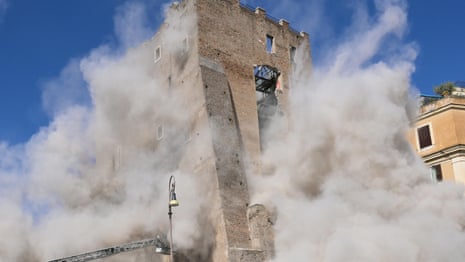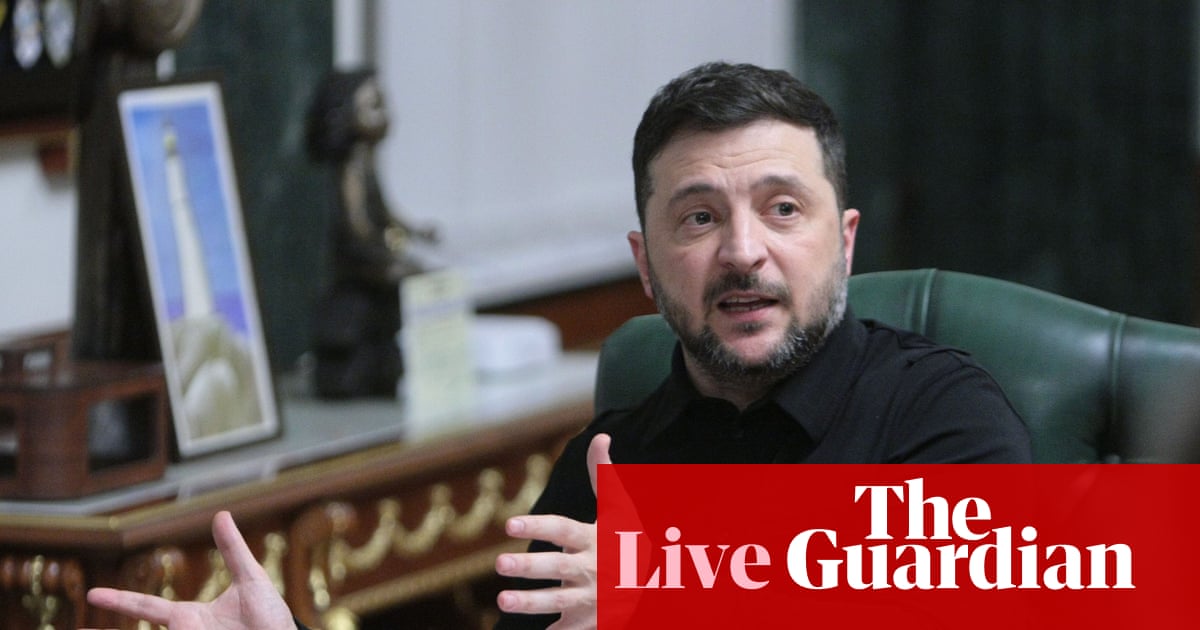Ukraine’s Zelenskyy, Moldova’s Sandu seek to ramp pressure on EU to accelerate accession talks Jakub Krupa
Jakub Krupa
In parallel to the commission’s briefing, Ukraine’s Zelenskyy and Moldova’s Maia Sandu spoke at the Euronews’s EU Enlargement Summit offering their reaction to the commission’s assessment.
Responding to the findings, they both tried to ramp up pressure on the EU to accelerate the talks, with Zelenskyy saying he would want Ukraine to join the bloc before 2030.
Speaking from the embattled city of Pokrovsk near the frontline, Zelenskyy spoke about Ukrainian soldiers being “at war not only for the sake of their own families, their own homes,” but more broadly “for the Ukrainian future, the future of Ukraine in the European Union.”
“Ukraine is fighting for its independence, and our future is in the EU, which is the part of our independence … and for us, it is an important factor that we are highly assessed in this [report],” he said.
Zelenskyy said he “would not like this [accession] process to be too long,” but acknowledged that this “does not depend on us,” as the pace at which the talks can be progressed was decided by the EU.
“The quicker Ukraine is able to open the clusters and to have the fully fledged negotiations, the better it is for us,” he said.
He also defended the anti-corruption reforms in Ukraine, despite the EU’s pointed criticism in this area (14:10).
Curiously, the Ukrainian president also revealed that he spoke with Donald Trump about Ukraine’s ambitions to become an EU member state, and the US president offered his support and allegedly promised to help unblock Hungary’s veto – but without a specific timeline.
Zelenskyy pointedly declined to consider putting forward a special offer to Hungary’s Viktor Orbán to get him to drop his veto, and added that his continued opposition to the accession process was only beneficial to Russia.
He added: “We are at war for our survival, and we would really like the prime minister of Hungary to support us, at least not block us.”
“If there are the [accession] rules and we comply with them, whatever is needed to open the clusters, we would like [that] to be respected. And it’s not only [a question of] respect to us, but the respect of the Hungarian leader to the rules and regulations of the European Union,” he said.
Moldova’s Sandu struck a similar tone, saying Moldova is ready to open the negotiations on all clusters, and is waiting for the EU to move ahead with the process, which remains stalled as Hungary continues to block progressing both Moldova and Ukraine’s candidacies together.
“I do understand that there are all kinds of solutions, but you also need to have a timetable to take a decision, a deadline to take a decision on this. Otherwise, they can discuss [it] for a long time,” she said.
“Both countries are ready to move to the next step. So, it’s now really up to the EU to adopt a decision and to move forward,” Sandu said.
“There are solutions, but again, these are to be taken by the EU member states and by the EU institutions. It’s not easy, but if the EU becomes a little bit more creative and if you want to solve this issue. I’m sure it can solve it,” she said.
In a stark warning, she said the pro-EU politicians managed to beat Russian disinformation and win the EU referendum, the presidential election and the parliamentary election in the last 24 months, but “if we don’t deliver in the next three years – we have the presidential elections in three years – … then what’s going to be the message to the people?”
Updated at 09.39 EST
Key events
1h ago
Closing summary
1h ago
Merz says Syrians no longer have reason for asylum in Germany
2h ago
Nord Stream suspect starts hunger strike in Italy over prison rights
2h ago
Spain grants citizenship to descendants of civil war’s International Brigades
2h ago
Germany plans extra €3bn in Ukraine military aid in 2026
2h ago
Manslaughter inquiry opened after death of worker in Rome tower collapse
3h ago
China plans further talks with EU on rare earth supply
3h ago
Ukraine ‘confidently moving toward full membership of EU,’ prime minister says
3h ago
Montenegro wants to join EU and be ’28th by 2028′
3h ago
Ukraine’s Zelenskyy, Moldova’s Sandu seek to ramp pressure on EU to accelerate accession talks
4h ago
Russia’s invasion of Ukraine ‘makes case for enlargement clear cut,’ but EU ‘won’t cut corners’ in process, foreign policy chief says
4h ago
EU press conference on enlargement imminent
5h ago
Ukraine making progress on EU path, but corruption remains worry and ‘red line’ – snap analysis
5h ago
‘Ukraine confidently moving towards EU membership,’ Zelenskyy says
5h ago
EU enlargement ‘realistic possibility’ given progress made, commission says
5h ago
EU’s enlargement review published, with praise for Montenegro, Albania, Ukraine, Moldova, and criticism for Serbia, Georgia
5h ago
Georgia ‘candidate country in name only,’ EU’s Kos warns amid ‘continued backsliding’ on fundamental rights
5h ago
Montenegro leads in accession plans, but ‘significant’ progress in Albania, Moldova, Ukraine, EU says
6h ago
China issues warning to Europe on supply of chips after Nexperia’s Dutch plant takeover
6h ago
Europe needs to show ‘greater attention and effort’ to counter Russian threat, Italian president says
6h ago
Can Spanish PM survive corruption cases against family and allies?
7h ago
Outrage in Paris as Shein prepares to open its first permanent store
8h ago
Dutch coalition forming process to get under way today
8h ago
Worker dies after being rescued from partially collapsed medieval tower in Rome
8h ago
Czechs mourn death of Catholic leader Duka
9h ago
EU’s rule of law reports ‘even less comprehensive’ this year, risks ‘backsliding’, campaigners warn
9h ago
Morning opening: The marking process
Show key events only
Please turn on JavaScript to use this feature
Closing summary Jakub Krupa
Jakub Krupa
… and on that note, it’s a wrap!
Ukrainian president Volodymyr Zelenskyy has said he would want to see Ukraine join the European Union by 2030, as he joined forced with Moldova’s president Maia Sandu to ramp pressure on the bloc to accelerate the accession talks (14:43, 15:21).
Their comments come after the European Commission published its enlargement review of the candidate countries, praising the progress made by Montenegro, Albania, Ukraine and Moldova, and criticising Serbia and Georgia (13:22, 13:24, 13:42, 14:37, 14:46, 15:43, 15:52).
But the commission pointedly said “further and steady progress is needed in the fight against corruption” in Ukraine, referencing the now-reversed corruption law reform over the summer (14:10).
Separately,
Italian president Sergio Mattarella warned that “the bloody conflict” triggered by Russia’s invasion on Ukraine “demands greater attention and a significant effort to adapt the military to create a common European defence force” to play a major role within Nato (12:42).
In the Netherlands, the coalition forming process is about to start this afternoon as leaders of the main parties meet to discuss next steps and appoint a “scout” to see what’s possible (11:06).
Syrians no longer have reason to be granted asylum in Germany after the end of their country’s civil war, according to chancellor Friedrich Merz, who said they will instead be encouraged to return to help with the reconstruction of their homeland (17:26).
China has issued a veiled warning to European leaders that restrictions on supply of chips critical for the car industry will continue to be affected by the Dutch government’s takeover of the Chinese-owned Nexperia plant last month (13:12).
Prosecutors in Italy have opened a manslaughter investigation over the death of a Romanian worker trapped when a medieval monument in central Rome partly collapsed (16:34).
Czechs are mourning the influential Catholic archbishop emeritus of Prague, Dominik Duka, who has died overnight at the age of 82 (10:23).
And that’s all from me, Jakub Krupa, for today.
If you have any tips, comments or suggestions, email me at jakub.krupa@theguardian.com.
I am also on Bluesky at @jakubkrupa.bsky.social and on X at @jakubkrupa.
ShareMerz says Syrians no longer have reason for asylum in Germany Kate Connolly
Kate Connolly
in Berlin
Syrians no longer have reason to be granted asylum in Germany after the end of their country’s civil war, according to chancellor Friedrich Merz, who said they will instead be encouraged to return to help with the reconstruction of their homeland.
German chancellor Friedrich Merz attends a press conference last week. Photograph: Ümit Bektaş/Reuters
During Syria’s 14-year civil war, Germany took in more refugees than any other country in the EU, but the chancellor and others in his coalition cabinet argue that the situation has changed since the fall of Bashar al-Assad’s government eleven months ago.
Merz said late on Tuesday that he expected many of the more than one million Syrians living in Germany would voluntarily return home.
“There are now no longer any grounds for asylum in Germany, and therefore we can also begin with repatriations,” he said. Those who refused to return could face deportation “in the near future”.
He appeared to contradict his foreign minister, Johann Wadephul, who after a visit to Damascus last week expressed doubt that many Syrians would choose to return given the devastation and ongoing instability, which he said made a dignified existence hard to imagine (Europe Live, Monday).
What few politicians want to touch on is the effect deportations might have on Germany, where hundreds of thousands of Syrians have integrated successfully, learning the language and joining the workforce – which is crying out for recruits at a time when the German population is rapidly ageing.
More than 7,000 Syrian doctors are employed in the health sector, often in rural regions which have been poorly served in recent decades.
Many of the 1.3 million Syrians living in Germany, almost a quarter of whom were born in their adopted home, have obtained citizenship, though the majority only hold temporary residence permits.
ShareNord Stream suspect starts hunger strike in Italy over prison rights
A Ukrainian man suspected of coordinating the 2022 sabotage of the Nord Stream gas pipelines has begun a hunger strike, demanding respect for his fundamental rights in prison, his lawyer told Reuters.
An Italian appeals court in Bologna last month ordered that the suspect, identified only as Serhii K. under German privacy laws, should be transferred to Germany, confirming a previous ruling that it had issued last month.
However, the former Ukrainian officer is currently held in an Italian high-security prison pending a further hearing at the Court of Cassation, the top court, which is expected to take place within about a month.
“Since October 31, SK has been refusing food to demand respect for his fundamental rights,” his lawyer Nicola Canestrini said in a statement to Reuters.
The Ukrainian is demanding adequate nutrition, a healthy environment, dignified detention conditions and “equal treatment with other inmates regarding family visits and access to information,“, Canestrini added.
ShareSpain grants citizenship to descendants of civil war’s International Brigades Stephen Burgen
Stephen Burgen
in Barcelona
The Spanish government has granted citizenship to 170 descendants of volunteers in the International Brigades in recognition of their fight against fascism during the Franco dictatorship that followed the civil war.
An estimated 32,000 volunteers from around the world joined the anti-fascist brigades during the civil war, including approximately 2,500 men and women from Britain and Ireland, of whom 530 were killed.
Pedro Sánchez attending Remembrance Day and Tribute to all the victims of the Military Coup, the Civil War and the Dictatorship in Madrid. Photograph: GIM/GTRES/Shutterstock
At a ceremony in Madrid, the Spanish prime minister, Pedro Sánchez, said of the new citizens: “It will be an honour to call them compatriots. We call for the defence of the same democracy as they did at a time when it is under threat around the world.”
This month is the 50th anniversary of the death of Francisco Franco, whose coup in July 1936 triggered the three-year conflict.
Jim Jump, the chair of the International Brigade Memorial Trust in London, said: “The Spanish government’s decision underlines its determination to erase the toxic legacy of the Franco dictatorship. Many families of International Brigaders continued to campaign for the restoration of democracy in Spain during those dark years.
“Spanish citizenship for them fulfils the spirit of the historic pledge made by the Spanish Republic to offer a home for the Brigaders.”
ShareGermany plans extra €3bn in Ukraine military aid in 2026
Germany plans to raise its military aid to Ukraine by three billion euros next year to around 11.5 billion euros to support its battle against Russia, the country’s finance ministry said, reported by AFP.
Finance minister Lars Klingbeil “will introduce a further three billion euros in support for Ukraine into the parliamentary budget process for 2026”, a ministry spokesman told AFP.
“This includes, among other things, artillery, drones, armoured vehicles and the replacement of two Patriot systems.”
ShareManslaughter inquiry opened after death of worker in Rome tower collapse Angela Giuffrida
Angela Giuffrida
in Rome
Prosecutors have opened a manslaughter investigation over the death of a worker trapped when a medieval monument in central Rome partly collapsed.
Octav Stroici, 66, was rescued on Monday night after 11 hours under fallen masonry but died of his injuries at the city’s Umberto I hospital. Romanian foreign affairs officials, who said he came from their country, thanked rescuers for their efforts to save him during a long, complex and delicate operation.
 Moment part of medieval tower in Rome collapses – video
Moment part of medieval tower in Rome collapses – video
Rome’s council announced that a day of mourning for Stroici would be held on Wednesday.
Lamberto Giannini, the city’s prefect, said: “The [rescue] operation lasted a long time because every time a part of the body was freed there was additional rubble that covered it.”
Stroici, from Suceava in northern Romania, had lived with his family in Italy for more than 30 years, La Repubblica reported. “He was an exquisite, calm and very good person,” a colleague told the newspaper.
Stroici had been among a team of 11 undertaking restoration works at the 29-metre Torre dei Conti, near the Colosseum, when it suffered two collapses on Monday.
Another worker, Gaetano La Manna, 66, was taken to San Giovanni hospital with injuries but discharged on Monday night, according to Corriere della Sera. Two others were rescued by firefighters using aerial ladders before the second collapse occurred, trapping Stroici inside.
ShareChina plans further talks with EU on rare earth supply Lisa O’Carroll
Lisa O’Carroll
Elsewhere, China has commited to further talks with the EU about easing the restrictions on the global exports of rare earths critical to the car industry, the European Commission has said.
While the White House said China would “eliminate China’s current and proposed export controls” on rare earths and critical minerals following a summit between Donald Trump and Chinese president Xi Jinping in Korea last week, the EU is still subject to some restrictions.
China agreed a global 12 month pause on new restrictions it threatened on 9 October as part of the deal hashed out with Trump in Korea last week.
However restrictions on rare earth exports imposed by China in April still apply to the EU, affecting everything from car assembly lines to the production of wind turbines and computer servers.
Ahead of a briefing of EU ambassadors on Wednesday, an EU spokesperson said progress had been made at a meeting of senior officials from both sides.
“The EU and China also discussed how to making supply chain stability in relation to other rare earths [notably those for which China imposed export controls in April 2025], and commited to further engage on licensing facilitation measures, including discussing general licences,” said trade spokesperson Olof Gill.
A new licensing system, he added, would “facilitate stable exports”.
ShareUkraine ‘confidently moving toward full membership of EU,’ prime minister says
Ukrainian prime minister, Yulia Svyrydenko, also responded to the EU’s assessment of the country’s progress in the accession process, welcoming the broadly positive assessment.
“This is our best result in three years – and most importantly, Ukraine has never received a negative ‘backsliding’ assessment. The report also highlights Ukraine’s progress in preparing for accession talks and readiness to open negotiation clusters,” she said.
She added that the government was “confidently moving toward full membership in the European Union – a goal that brought millions of Ukrainians to the Maidan nearly 13 years ago, and one we have since defended and enshrined in our constitution.”
Ukraine is an integral part of Europe.
ShareMontenegro wants to join EU and be ’28th by 2028′
Meanwhile, Montenegrin deputy prime minister for foreign and European affairs, Filip Ivanović, said the country aimed to close all negotiation chapters and complete membership talks with the EU by the end of 2026, Reuters reported.
“We are looking forward to becoming the first next member of the EU,” Ivanovic told a Euronews conference on EU enlargement in Brussels.
“This is why we are saying 28 by 28, so the 28th member state by 2028,” he said.
Updated at 09.45 EST
Ukraine’s Zelenskyy, Moldova’s Sandu seek to ramp pressure on EU to accelerate accession talks Jakub Krupa
Jakub Krupa
In parallel to the commission’s briefing, Ukraine’s Zelenskyy and Moldova’s Maia Sandu spoke at the Euronews’s EU Enlargement Summit offering their reaction to the commission’s assessment.
Responding to the findings, they both tried to ramp up pressure on the EU to accelerate the talks, with Zelenskyy saying he would want Ukraine to join the bloc before 2030.
Speaking from the embattled city of Pokrovsk near the frontline, Zelenskyy spoke about Ukrainian soldiers being “at war not only for the sake of their own families, their own homes,” but more broadly “for the Ukrainian future, the future of Ukraine in the European Union.”
“Ukraine is fighting for its independence, and our future is in the EU, which is the part of our independence … and for us, it is an important factor that we are highly assessed in this [report],” he said.
Zelenskyy said he “would not like this [accession] process to be too long,” but acknowledged that this “does not depend on us,” as the pace at which the talks can be progressed was decided by the EU.
“The quicker Ukraine is able to open the clusters and to have the fully fledged negotiations, the better it is for us,” he said.
He also defended the anti-corruption reforms in Ukraine, despite the EU’s pointed criticism in this area (14:10).
Curiously, the Ukrainian president also revealed that he spoke with Donald Trump about Ukraine’s ambitions to become an EU member state, and the US president offered his support and allegedly promised to help unblock Hungary’s veto – but without a specific timeline.
Zelenskyy pointedly declined to consider putting forward a special offer to Hungary’s Viktor Orbán to get him to drop his veto, and added that his continued opposition to the accession process was only beneficial to Russia.
He added: “We are at war for our survival, and we would really like the prime minister of Hungary to support us, at least not block us.”
“If there are the [accession] rules and we comply with them, whatever is needed to open the clusters, we would like [that] to be respected. And it’s not only [a question of] respect to us, but the respect of the Hungarian leader to the rules and regulations of the European Union,” he said.
Moldova’s Sandu struck a similar tone, saying Moldova is ready to open the negotiations on all clusters, and is waiting for the EU to move ahead with the process, which remains stalled as Hungary continues to block progressing both Moldova and Ukraine’s candidacies together.
“I do understand that there are all kinds of solutions, but you also need to have a timetable to take a decision, a deadline to take a decision on this. Otherwise, they can discuss [it] for a long time,” she said.
“Both countries are ready to move to the next step. So, it’s now really up to the EU to adopt a decision and to move forward,” Sandu said.
“There are solutions, but again, these are to be taken by the EU member states and by the EU institutions. It’s not easy, but if the EU becomes a little bit more creative and if you want to solve this issue. I’m sure it can solve it,” she said.
In a stark warning, she said the pro-EU politicians managed to beat Russian disinformation and win the EU referendum, the presidential election and the parliamentary election in the last 24 months, but “if we don’t deliver in the next three years – we have the presidential elections in three years – … then what’s going to be the message to the people?”
Updated at 09.39 EST
Kallas also gets asked about Serbia and whether it is at risk of becoming “a candidate in the name only” given the situation in the country.
She acknowledges that the report is “critical,” but says the EU remained “in a constant contact with the government, with the president, and they promise they will deliver.”
She insists she “doesn’t see” Serbia going down the same negative path as Georgia.

